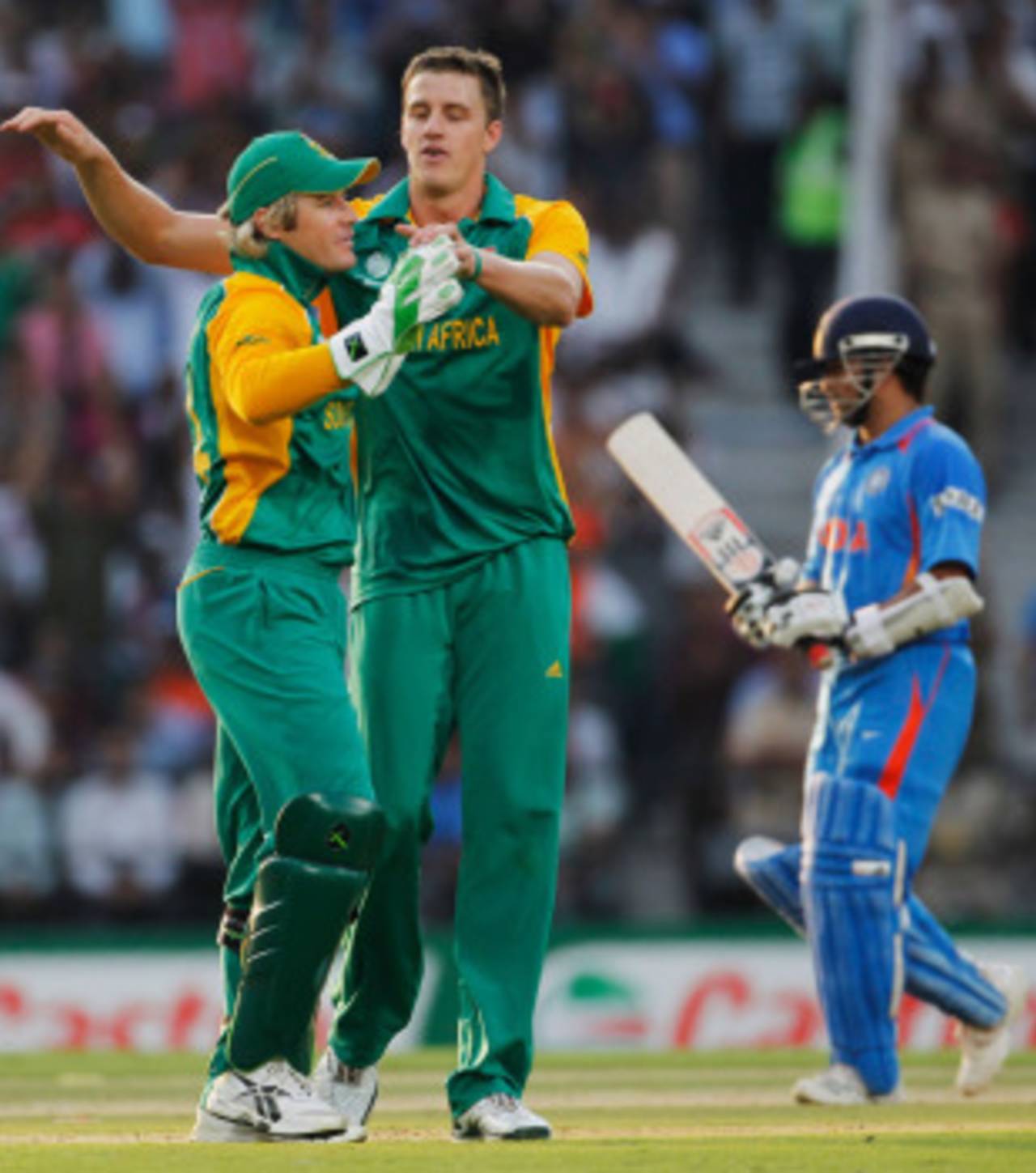Imagine that India's World Cup campaign is an upside-down cake. What else could you say about their cricket in Nagpur on Saturday, other than it overturned?
All that had seemed to work so far in their previous four group games - solidity in the middle order, the ability to calculate risks and plan innings - fell apart.
All that had regularly fallen apart or just imploded - the threat of the bowlers, the zest of the fielders - was suddenly looking the real deal.
Any respectable baker knows that if the recipe of the upside-down cake is not followed to utter precision, if the temperature is not absolutely spot on, that cake will not respond like normal ones and become stodgy, or just not rise and turn into porridge. That cake and its best parts will end up burnt and bitter. In Nagpur on Saturday, India failed to be precise, they heated themselves at the wrong time and were well and truly burnt. Defeat at the hands of South Africa by three wickets in Nagpur. Their dinner will taste of ashes.
The match was what it was meant to be: a contest between the World Cup's two strongest contenders who had just spent the better part of the southern hemisphere summer banging heads. When they met again in Nagpur, in India's biggest game of this World Cup so far, the head-banging continued. It was a riveting contest, filled with incident, individuals falling and rising within the space of a few overs, teams rising and falling and rising within hours.
Beaten by England when they should have won, triumphant in Nagpur when they could have lost, South Africa have risen. India, who have talked about raising their tempo, finding their rhythm, gaining momentum, have fallen. They were tripped not by the familiar frailties that had come up against the weaker teams, but against a newer, more threatening anxiety. That when India are up against one of the best and most varied bowling attacks in the World Cup, their strongest suit could suddenly go shabby.
Nine for 29 are not numbers that the Indians will be allowed to forget for the rest of this campaign. Captain MS Dhoni, frozen and furious on the other end for more than half an hour of his 12 not out, will never want to remember it. Nine for 29 is a coded message sent out by the Indian batsmen to all other frontline teams in the World Cup to take a close look at India's flaws. That the fortress could be breached.
The real irony is that India's batsmen were not bombed out by the short ball; Morne Morkel had to be taken off after seven overs, Dale Steyn's first spell went for 24 off three. After his seventh over he had conceded 46. Yet it is how he finished his overs - 5 for 50 that counted. His wicket-taking spell - 16 balls, four runs, five wickets - reads so implausible that the only time Steyn could possibly repeat it is if he was asked to bowl to Canada Under-19s. Steyn on the scent can in any case be a menace on two legs. Steyn in that mood, bowling to batsmen whose calculation and planning has melted into mush, becomes what Nagpur was. The theatre of the absurd. Those lovely idioms about well begun being half done have never been more untrue at the hands of the Indian batting, which began exceptionally well but ended up in a heap.
The aftershock of the nine for 29 will erase the memory of few aspects of India's game that were actually good today. The impact of one repeatedly annihilated the memory of the other. The two century stands between Tendulkar (whose 99th international 100 is already buried under the rubble) and Sehwag and then Tendulkar and Gambhir had the audience and the team dreaming of 370. After being indistinct in the first few games, the top three had batted like top three must and did what they were meant to do. They had gobbled up the overs and sent the run-rate into orbit. What they had done, unintentionally of course, was make those that followed them assume that the rest was going to be easy.
The South African bowlers, led in the middle overs by the parsimonious Johan Botha, started to take the pace off the ball, the pitch began to slow down further and the batsmen who followed the top three were struggling with timing.
Both Gambhir and Tendulkar were out when trying to push the pace, the batsmen who followed them believed that in the Power Plays demanded mayhem. They wanted to inflict it on the bowlers but ended up dispensing it on their team. A methodical response to the situation rather than flailing at full tosses or trying to hit the ball out of the ground would at least have seen India through the 50 overs. Eight more balls, maybe eight more runs. Small steps, significant meanings.
Dhoni's shuffling of the batting order - Yusuf Pathan before Yuvraj Singh, Virat Kohli at No. 7 - had been greeted with many a raised eyebrow, but the captain was backed by evidence from previous games, that his batsmen could independently work out the calculations of setting a total. The nine for 29 that will sting Indians even harder in the week before their last group match, because when South Africa came in to bat, the Indian bowlers and fielders laid siege to the target of 297 with an energy and a spirit not found in previous games. When up against qualify opposition, Harbhajan lifted his game. Zaheer Khan conceded four off the penultimate over. Off the last over, the South Africans were left with 13 to get. India in the field had pushed as hard as they could. India with the bat tried to push too much. Everything turned upside down.
Sharda Ugra is senior editor at ESPNcricinfo
